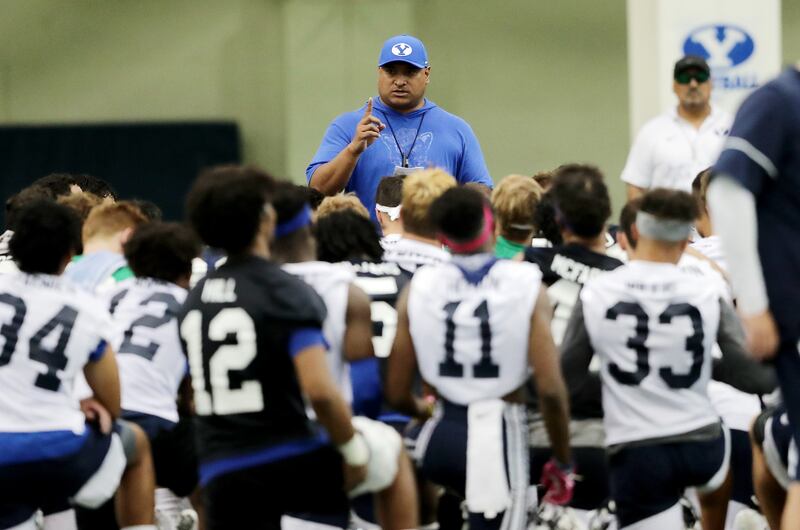Kalani Sitake, like Bronco Mendenhall before him, is constantly looking for new ways to milk all he can out of BYU’s football program.
If that means introducing a new routine, emphasizing something different, adding a wrinkle to the regular operations of fall camp, so be it.
He has to. There are few places like the one where he coaches and he has to find competitive advantages.
This year, a new thing is studying how his coaches and players learn, and exploring what strengths he may take advantage of in players he’s recruited.
According to tight end Matt Bushman, Sitake also began having players share their own personal stories, what makes them tick and what has happened to them in their lives. This is something each player is invited to share with the squad. “That has really helped, learning the background of players,” said Bushman.
Sitake likes what he’s seen in his tweaks for 2019.
“I hate to compare year to year because I think every year is a different deal. We're doing things different this year, things we have never done before. And we're gonna do things next year that's gonna be different than what we're doing now.”
Back in Mendenhall’s day, he had what he called an eco-challenge, a kind of triathlon of events that included biking, hiking, running, swimming — and he joined in. He also burned jerseys and other equipment to signify a new beginning after he got the job. One summer he gave everyone a coin and asked members of the team to keep it with them all the time, as a reminder of a principle.
“I think you’ve got to have some things that carry over, but for the most part, we have to look at that. You can't just keep doing the same things over and over again, expecting different results. We tweak things,” Sitake explained.
That is a Mendenhall idiom right there.
The big thing this year, Sitake explained, is peer-to-peer learning.
“We've had our players really take the initiative as far as teaching and we've brought in a lot of different people that help train our coaches and our players on the concept of learning right. So, we try to make it a culture of learning, not just on football only, but just trying to get them to understand that learning is really important for our progress.
“As a person, I think it's our coaches. They can always learn how to improve how to teach. If you can understand how kids learn nowadays, well, it's different than it was 10 years ago.”
One teacher brought in was Trevor Ragan, a specialist who has worked with thousands of coaches and athletes, the U.S. Women’s Volleyball Team, the U.S. Olympic Training Center in Colorado Springs, professional players, bestselling authors and renowned professors across the globe. Ragan came in from China for BYU’s first Saturday of fall camp to discuss learning concepts with players and coaches.
Some topics on Ragan’s website Trainugly.com include: keys to a better learning culture, being better when you’re nervous, the science of better decisions, sleep and learning, desirable difficulties, and the Pygmalion effect.
Sound a little egg-headish?
Probably.
His clients include UCLA, Michigan State, the Green Bay Packers, Cleveland Indians, World Bank and Microsoft.
If this little dose of brain food adds to the abilities of Sitake and his coaching staff to more efficiently teach football and have players absorb it faster and easier and then teach one another, it’s likely far more productive than fighting for the Xbox controllers in the players' lounge.
Sometime this past year, Sitake surveyed the players he had, their strengths and capabilities, and decided he could push a few buttons harder and create a few more toggles to get more out of the program.
This learning deal among peers is something Sitake says stands out the most of all he’s changed since last season. After the first week, he told reporters he saw a difference in practice because of preparation by players when coaches were not present in the dog days of summer.
Sitake said that because BYU is a difficult place to attend, they want to find ways to use that difficulty to a competitive advantage.
Another tweak is holding practices in the afternoon instead of the morning like a year ago.
To a man, everyone I’ve talked to this past week, whether a coach or player, has cited summer preparation as a key to coming to practice more prepared. Peer learning.
So, what’s it all mean?
Will results be displayed in more passes completed, catches made, tackles, sacks, interceptions, third-down conversions and execution? Who knows.
But what family or organization could not benefit from more efficient learning from one another?


